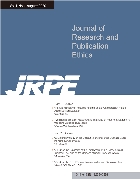- 권한신청
- E-ISSN2733-7146
- KCI Candidate
4권 1호
초록
Abstract
Purpose: Poor anonymity and confidential strategies by a researcher not only develop unprecedented and precedented harm to participants but also impacts the overall critical appraisal of the research outcomes. Therefore, understanding and applying anonymity and confidentiality in research is key for credible research. As such, this research expansively presents the importance of anonymity and confidentiality for research surveys through critical literature reviews of past works. Research design, data and methodology: This research has selected the literature content approach to obtain proper literature dataset which was proven by high degree of validity and reliability using only books and peer-reviewed research articles. The current authors have conducted screening procedure thoroughly to collect better fitted resources. Results: Research findings consistently mentioned the confidentiality and anonymity principles are preserved and implemented as a means of protecting the privacy of all individuals, establishing trust and rapport between researchers and study participants, as a way of critically upholding research ethical standards, and preserving the integrity of research processes. Conclusions: Confidentiality and anonymity are research ethical principles that help in providing informed consent to participants assuring subjects of the privacy of their personal data. As provided by research bodies and organizations, every research process has to incorporate the principles to meet credibility.
초록
Abstract
Purpose: Adequate public input and participation in environmental health research must be provided to ensure accurate results from studies involving human exposure to potentially hazardous substances. By addressing these ethical issues associated with environmental health research, this study can help reduce risks for individuals participating in studies and whole communities affected by their impactful findings. Research design, data and methodology: The current research should have followed the rule of qualitative textual research, searching and exploring the adequate prior resources such as books and peer-reviewed journal articles so that the current author could screen proper previous works which are acceptable for the content analysis. Results: The current research has figured out four ethical issues to improve environmental health study as follows: (1) Lack of Guidance for Collecting and Utilizing Data Ethically, (2) Insufficient Consideration Is Given to Vulnerable Populations When Conducting Studies, (3) Unclear Standards Exist for Protecting the Privacy Of Participant's Personal Information, and (4) Conducting Socially and Religiously Acceptable Research in Various Communities. Conclusions: This research concludes that future researchers should consider implementing anonymization techniques where possible so that findings are still accessible, but the risk posed by disclosing identifying information remains minimized during the analysis/publication stages.
초록
Abstract
Purpose: Psychological and clinical studies targeting children and adolescents have become increasingly important in recent years as researchers strive to understand better the psychological and physiological development of children and teens. The purpose of the study is to explore significant research ethics on the psychological and clinical study targeting children and adolescents. In addition to these ethical considerations, international and national codes of ethics and regulatory bodies guide ethical research practices with children and adolescents. Research design, data, and methodology: The present study used the qualitative textual collection through investigating the past and current literature review. Numerous prior studies have conducted this research design to obtain the right prior studies. Results: Previous Research has indicated there are four research ethics on the psychological and clinical study targeting children and adolescents. (1) Respect for autonomy, (2) Respect for privacy and confidentiality, (3) Respect for vulnerability, (4). Respect for beneficence. Conclusions: In conclusion, research ethics are essential for protecting children and adolescents when conducting psychological and clinical studies. In the future, research should focus on developing innovative methods to ensure the safety of children and adolescents while still allowing them to participate in research.
초록
Abstract
Purpose: While prior research has identified ethical issues in marketing research, more research needs to identify specific ethical behaviors that marketing researchers should adopt. This research addresses this gap by identifying a few ethical behaviors that marketing researchers should consider. Research design, data and methodology: The present study has a justification to collect adequate textual data in the current literature using screening process based on the marketing ethics topics and themes, and ethical behaviors of marketing researchers. Results: Based on the literature analysis, a marketing ethics model, which included the principles of fairness, honesty, responsibility, and respect for stakeholders. Since the rise of e-commerce and technology, a growing demand for a method to analyze website user behavior has been growing. Researchers in the field of marketing are responding to this demand by creating innovative interactive platforms. Conclusions: The term "ethical practices in market research" refers to a collection of best practices that, when followed, increase the likelihood that the research carries out is ethical, fair, and accurate. Because there needs to be more theoretical work done on the topic, there should be more empirical studies on ethical behaviors in marketing research.














